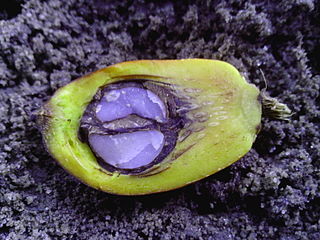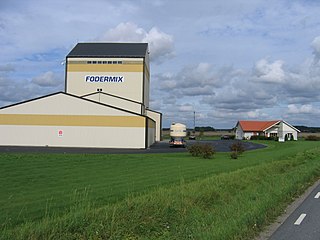The following outline is provided as an overview of and topical guide to agriculture:

A farm is an area of land that is devoted primarily to agricultural processes with the primary objective of producing food and other crops; it is the basic facility in food production. The name is used for specialized units such as arable farms, vegetable farms, fruit farms, dairy, pig and poultry farms, and land used for the production of natural fiber, biofuel, and other commodities. It includes ranches, feedlots, orchards, plantations and estates, smallholdings, and hobby farms, and includes the farmhouse and agricultural buildings as well as the land. In modern times, the term has been extended so as to include such industrial operations as wind farms and fish farms, both of which can operate on land or at sea.

Animal husbandry is the branch of agriculture concerned with animals that are raised for meat, fibre, milk, or other products. It includes day-to-day care, management, production, nutrition, selective breeding, and the raising of livestock. Husbandry has a long history, starting with the Neolithic Revolution when animals were first domesticated, from around 13,000 BC onwards, predating farming of the first crops. By the time of early civilisations such as ancient Egypt, cattle, sheep, goats, and pigs were being raised on farms.

Free range denotes a method of farming husbandry where the animals, for at least part of the day, can roam freely outdoors, rather than being confined in an enclosure for 24 hours each day. On many farms, the outdoors ranging area is fenced, thereby technically making this an enclosure, however, free range systems usually offer the opportunity for the extensive locomotion and sunlight that is otherwise prevented by indoor housing systems. Free range may apply to meat, eggs or dairy farming.

Forced molting, sometimes known as induced molting, is the practice by some poultry industries of artificially provoking a flock to molt simultaneously, typically by withdrawing food for 7–14 days and sometimes also withdrawing water for an extended period. Forced molting is usually implemented when egg-production is naturally decreasing toward the end of the first egg-laying phase. During the forced molt, the birds cease producing eggs for at least two weeks, which allows the bird's reproductive tracts to regress and rejuvenate. After the molt, the hen's egg production rate usually peaks slightly lower than the previous peak, but egg quality is improved. The purpose of forced molting is therefore to increase egg production, egg quality, and profitability of flocks in their second or subsequent laying phases, by not allowing the hen's body the necessary time to rejuvenate during the natural cycle of feather replenishment.
Bone meal is a mixture of finely and coarsely ground animal bones and slaughter-house waste products. It is used as a dietary supplement to supply calcium and phosphorus to monogastric livestock in the form of hydroxyapatite. As a slow-release organic fertilizer, it supplies phosphorus, calcium, and a small amount of nitrogen to plants.

Organic egg production is the production of eggs through organic means. In this process, the poultry are fed organic feed. According to the United States Department of Agriculture, organic means that the laying hens must have access to the outdoors and cannot be raised in cages. Only natural molting can occur within the flock; forced molting is not allowed. Organic certification also requires maintenance of basic animal welfare standards.
Intensive animal farming, industrial livestock production, and macro-farms, also known as factory farming, is a type of intensive agriculture, specifically an approach to animal husbandry designed to maximize production while minimizing costs. To achieve this, agribusinesses keep livestock such as cattle, poultry, and fish at high stocking densities, at large scale, and using modern machinery, biotechnology, and global trade. The main products of this industry are meat, milk and eggs for human consumption.

Animal feed is food given to domestic animals, especially livestock, in the course of animal husbandry. There are two basic types: fodder and forage. Used alone, the word feed more often refers to fodder. Animal feed is an important input to animal agriculture, and is frequently the main cost of the raising or keeping of animals. Farms typically try to reduce cost for this food, by growing their own, grazing animals, or supplementing expensive feeds with substitutes, such as food waste like spent grain from beer brewing.

The palm kernel is the edible seed of the oil palm fruit. The fruit yields two distinct oils: palm oil derived from the outer parts of the fruit, and palm kernel oil derived from the kernel.

Poultry farming is a part of the United States's agricultural economy.

Livestock are the domesticated animals raised in an agricultural setting in order to provide labour and produce diversified products for consumption such as meat, eggs, milk, fur, leather, and wool. The term is sometimes used to refer solely to animals who are raised for consumption, and sometimes used to refer solely to farmed ruminants, such as cattle, sheep, and goats. Horses are considered livestock in the United States. The USDA classifies pork, veal, beef, and lamb (mutton) as livestock, and all livestock as red meat. Poultry and fish are not included in the category. The latter is likely due to the fact that fish products are not governed by the USDA, but by the FDA.

Manure is organic matter that is used as organic fertilizer in agriculture. Most manure consists of animal feces; other sources include compost and green manure. Manures contribute to the fertility of soil by adding organic matter and nutrients, such as nitrogen, that are utilised by bacteria, fungi and other organisms in the soil. Higher organisms then feed on the fungi and bacteria in a chain of life that comprises the soil food web.

Agrifirm is a cooperative enterprise in which more than 10.000 Dutch farmers and horticulturalists have combined their purchasing power. Agrifirm in its current form was founded in 2010 due to a successive merger of regional cooperatives. The enterprise operates as a link for farmers being currently active throughout the entire Netherlands. The Coöperative also has business units in Belgium, Germany, France, Spain, Romania, Hungary, Poland, Serbia, Ukraine, Brazil, Uruguay and China. The head office is located in Apeldoorn, Netherlands.

Poultry feed is food for farm poultry, including chickens, ducks, geese and other domestic birds.

Antibiotic use in livestock is the use of antibiotics for any purpose in the husbandry of livestock, which includes treatment when ill (therapeutic), treatment of a group of animals when at least one is diagnosed with clinical infection (metaphylaxis), and preventative treatment (prophylaxis). Antibiotics are an important tool to treat animal as well as human disease, safeguard animal health and welfare, and support food safety. However, used irresponsibly, this may lead to antibiotic resistance which may impact human, animal and environmental health.

Vilofoss is a company that produces and trades with vitamin and mineral premixes for the feedstuff industry. Vilofoss is a brand name that consists of four companies in four different countries; Vitfoss is placed in Denmark, Calcialiment in France, Deutsche Vilomix in Germany and Fodermix in Sweden. They all operate in their country land but when they are trading on international markets, they do it under a mutual name – Vilofoss. Vilofoss has a total of 14 factories producing vitamins and minerals under brands such as: Vitfoss and Stormøllen (Denmark), Fodermix (Sweden), Calcialiment and Echarm (France), Deutsche Vilomix (Germany) and Vilofoss. Vilofoss is already one of the three biggest companies in the European market.

Dansk Landbrugs Grovvareselskab, officially DLG, is a Danish co-operative company owned by Danish farmers. The main business areas are farm supplies, vitamins and minerals, service and energy. Activities comprise trade in seed grain, grain and other crops, animal nutrition, vitamins and minerals for animal feed and fuel for agriculture. DLG’s principal markets are Denmark, Germany and Sweden, but export across Europe, the Middle East, Africa and South America also constitutes a large part of the business. The exports comprise malting barley, feed grain and bread grain, rapeseed and rapeseed oil.
Biomin is an animal health and nutrition company headquartered in Inzersdorf-Getzersdorf, Austria. Biomin develops and produces feed additives and premixes for livestock animals including swine, poultry, dairy and beef cattle as well as aquaculture.

Feed manufacturing refers to the process of producing animal feed from raw agricultural products. Fodder produced by manufacturing is formulated to meet specific animal nutrition requirements for different species of animals at different life stages. According to the American Feed Industry Association (AFIA), there are four basic steps:
- Receive raw ingredients: Feed mills receive raw ingredients from suppliers. Upon arrival, the ingredients are weighed, tested and analyzed for various nutrients and to ensure their quality and safety.
- Create a formula: Nutritionists work side by side with scientists to formulate nutritionally sound and balanced diets for livestock, poultry, aquaculture and pets. This is a complex process, as every species has different nutritional requirements.
- Mix ingredients: Once the formula is determined, the mill mixes the ingredients to create a finished product.
- Package and label: Manufacturers determine the best way to ship the product. If it is prepared for retail, it will be "bagged and tagged," or placed into a bag with a label that includes the product's purpose, ingredients and instructions. If the product is prepared for commercial use, it will be shipped in bulk.

















